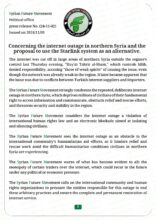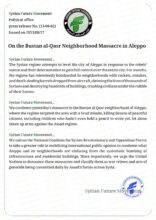The Impact of Saudi-Israeli Normalization on Syria

In his recent interview on Fox News, Saudi Prince Mohammad bin Salman ended the debate regarding the possibility of his country’s normalization with the “state” of Israel. In principle, Saudi Arabia does not reject the idea of normalization, but it does not want it to come at no cost. This means not at the expense of Saudi Arabia’s pivotal regional role, as it is the leading Arab country, spearheading an Arab alliance. Saudi Arabia has recently proven its effectiveness in managing the Arab League, and its voice is heeded throughout the Arab region. Its pivotal role in most regional issues makes it the focal point and center of attention for many, starting with the Taif Agreement in Lebanon in 1989, the Mecca Agreement between Palestinians in 2007, and not least its sponsorship of the Syrian Negotiation Commission. Most recently, the head of the Syrian regime was invited to the current sessions of the Arab League in 2023.
What would satisfy Saudi Arabia for it to officially normalize with Israel?
While the journey of Arab normalization is in its final stages, the latest Gulf state to normalize (the UAE) lost its potential role in Palestine (Arab) while making significant strides in its relations with Israel (Zionist). This is something Saudi Arabia wants to avoid at all costs. It wants normalization, but not at the expense of its religious relationship (with the third holiest site located there) and its political ties to Palestine (given its sponsorship of the Mecca Agreement). Hence, the Saudi Crown Prince is throwing the normalization ball into the court where Israel and the U.S. stand as one team. They have no choice but to find a feasible and acceptable solution to the age-old Palestinian-Israeli conflict, whether through a two-state solution or another viable option.
What if the duo rushing to normalize (the U.S. and Israel) fails to convince the Palestinian authority? Especially since the current Israeli reality, amid tensions between Netanyahu and Ben Gvirover judicial reforms, makes Israel unprepared to dictate peace terms to the Palestinians. Israelis offer another proposal: The Palestinians are not ready for a solution, and if normalization with Arabs occurs, led by Saudi Arabia, it would convince the Palestinians to settle. They don’t ask the Arabs to oppose the Palestinians, but rather to pressure them into accepting a comprehensive settlement through normalization with Israel.
We have two normalization plans then: the Saudi plan through ending the Palestinian-Israeli hostility first, with the Arabs possibly assisting, and the Israeli plan of prioritizing normalization over other steps.
So, we’re looking at scenarios all leading to upcoming normalization between Saudi Arabia and Israel, also awaiting a mutually acceptable solution between the Israelis and Palestinians. There’s an attempt to have the U.S. act as a facilitator, not a hindrance, accelerating towards normalization as desired by Biden (to gain an advantage in the upcoming U.S. presidential campaign) and alleviating the repercussions on Saudi Arabia.
Where does Syria stand amidst this normalization?
Whether they are loyalists, opposition, or rebels, Syrians hold a deep-rooted significance to the Palestinian cause. Broadly, they don’t publicly accept normalization with Israel due to various religious, political, social, and other reasons. Those in the opposition who tried to tread the path of normalization faced backlash, as seen with figures like Fahd al-Masri, Kamal al-Labwani, and Abdul Jalil al-Saeed when he was a member of the Astana platform and the General Secretariat of the Syrian Tomorrow Movement led by Ahmed al-Jarba, who is close to Saudi Arabia.
So, what is the impact of normalization on Syria – both its regime and opposition?
1- Impact on the regime:
Regardless of the normalization scenario, the Syrian regime stands to gain. How? If the Israeli plan for normalization goes ahead, the Palestinians will only have the “Resistance Axis”, including “Iran – Syria – plus Hamas, Islamic Jihad, and the General Command of the Palestine Liberation Organization” supporting them. This means that the Syrian regime will leverage its Arab and nationalist depth, potentially forming alliances with countries opposing Israel, and might even rally Arab support. Additionally, this would bring the entirety of the Resistance Axis back to its side in a more robust regional alignment. Conversely, if the Saudi plan materializes, the regime won’t be alone; even Iran will be faced with this new reality, presenting the regime with two options: either enter the normalization game while maintaining ties with Iran and Hezbollah or remain in Iran’s axis, which will have multiple scenarios for the Palestinian-Israeli solution. This makes Syria pivotal in any nuclear deal negotiations.
2- Impact on the Syrian opposition:
The Syrian opposition faces two choices:
First: Rejecting normalization with Israel, which is the popular stance, possibly compelling them to align somehow with the Syrian regime and Iran. This, assuming that the Syrian opposition is unified, would mean groups like the Muslim Brotherhood and other religious entities opposing Israel are unlikely to see Saudi Arabia as an ally post-normalization. They might lean towards Iran as the lesser of two evils. This could lead to a new Syria where the regime and the opposition align under an Iranian influence, potentially paving the way for a Syrian-Syrian settlement within a new alliance.
Second: Embrace realism, exploit the new positioning, and consider normalization talks with Israel under the Saudi umbrella. Especially since their ally, Turkey, will be distant from these alignments and might also normalize with Israel, having preceded others in doing so. If the Syrian opposition chooses normalization in exchange for unequivocal support against the regime and the expulsion of Iranians from Syria, it means reigniting the southern front, revisiting operations rooms like the “MOC” and “MOM”, entering a genuine conflict with the regime to topple it, and grinding Iran and its proxies, which won’t be easy considering Turkish-Russian agreements. However, Israel has its terms and equations that can be imposed on everyone once there’s an agreement on a comprehensive solution to the existential Syrian-Israeli issue.
Conclusion and Recommendation:
Undoubtedly, in the Syrian Future Movement, we believe that the option of forging an agreement between the Palestinians and Israelis is the only available choice for the entire Palestinian issue. However, given the complexity of the scene and the fragmentation of the Palestinian state, normalization might proceed with the consent of some Palestinians and the rejection by others. This means the continuation of the Palestinian hemorrhage on one hand and the exploitation of the Palestinian cause to bolster specific rulers’ positions on the other. Therefore, the choice of the Kingdom of Saudi Arabia to wait for a real, final peace between the Palestinians and Israel seems the safest, most appropriate, and lasting solution.
We, in the Syrian Future Movement, recommend convening a comprehensive national conference that gathers the Syrian opposition and all Palestinian leaderships. This assembly should convey messages that we, as the Syrian opposition, are capable of presenting an integrated project carrying a vision for the solution. It should be prioritized when needed (based on mutual interests first) and serve the causes of both our peoples and countries.






